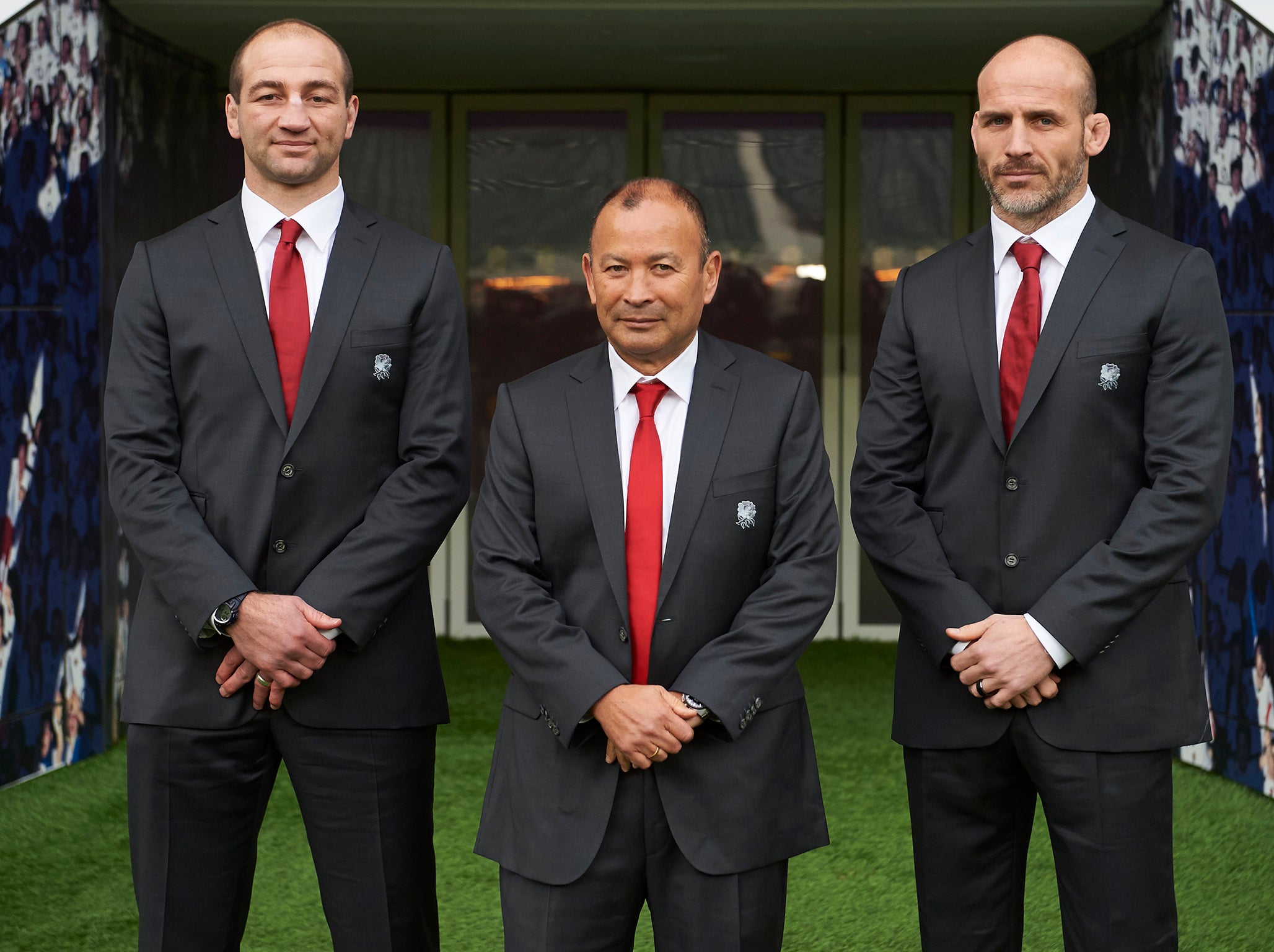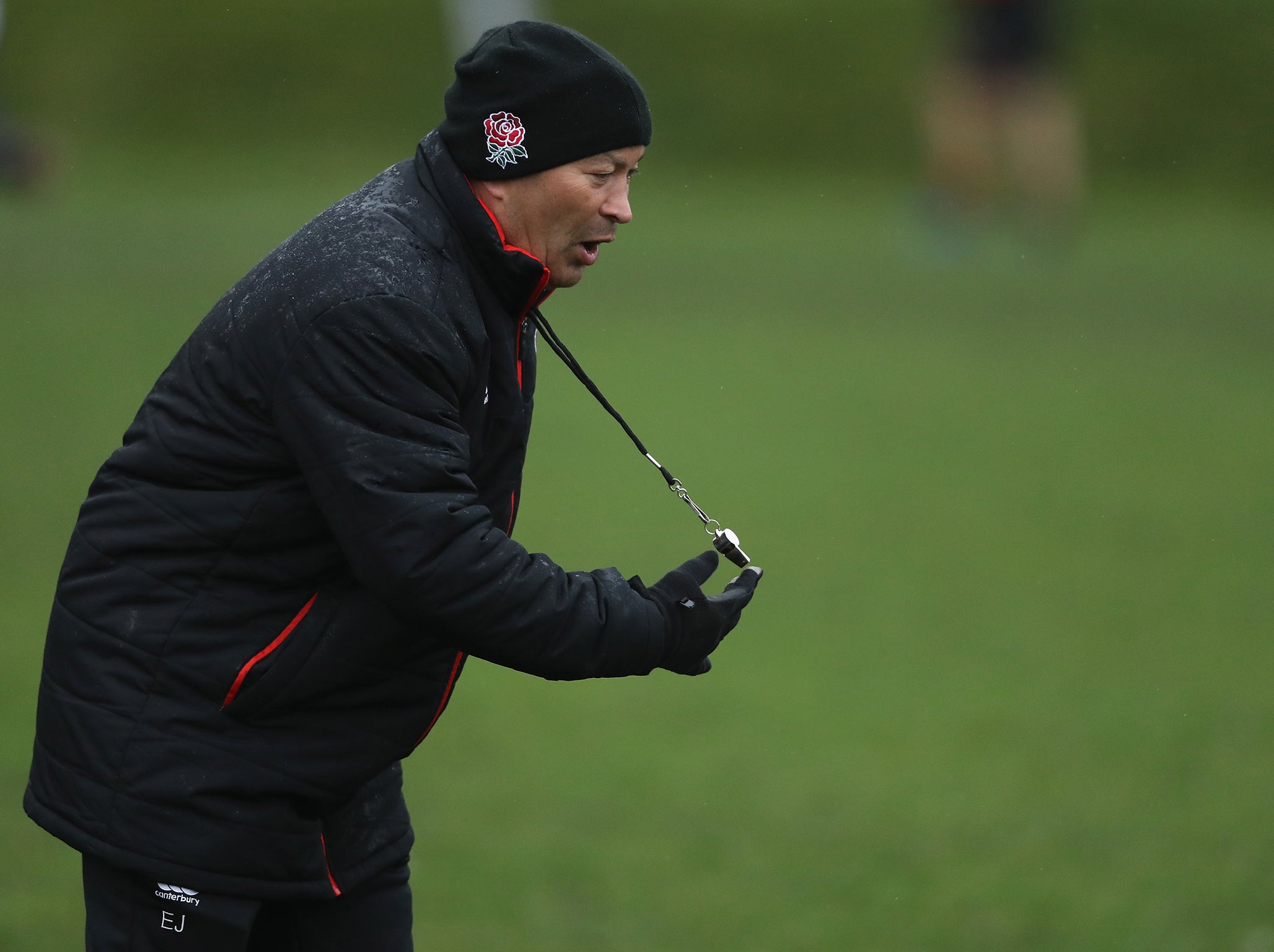Eddie Jones' new contract shows that his potential successors are not yet ready for the England job
Jones already has one eye on the future of English rugby, in the hope of leaving it in the best place possible for sustained success

Your support helps us to tell the story
From reproductive rights to climate change to Big Tech, The Independent is on the ground when the story is developing. Whether it's investigating the financials of Elon Musk's pro-Trump PAC or producing our latest documentary, 'The A Word', which shines a light on the American women fighting for reproductive rights, we know how important it is to parse out the facts from the messaging.
At such a critical moment in US history, we need reporters on the ground. Your donation allows us to keep sending journalists to speak to both sides of the story.
The Independent is trusted by Americans across the entire political spectrum. And unlike many other quality news outlets, we choose not to lock Americans out of our reporting and analysis with paywalls. We believe quality journalism should be available to everyone, paid for by those who can afford it.
Your support makes all the difference.Having seen the All Blacks sit atop of the world rankings for the entirety of this decade, the Rugby Football Union is taking a leaf out of the reigning world champions’ playbook in the hope that Wednesday’s extension of Eddie Jones’s contract under their new “transition period” will be the start of a model that can be used long after the Australian has left the role.
New Zealand has topped World Rugby’s rankings since November 2009, claiming back-to-back Rugby World Cup victories in that time, with Jones currently halfway through his grand plan that aims to knock Steve Hansen’s side off top spot and end their global domination at Japan 2019.
But after signing a new contract on Wednesday that will see him remain in the job until 2021 – alongside his successor for the final 12-18 months – he also has one eye on the future of English rugby in the hope of leaving it in the best place possible for sustained success. It’s something that New Zealand have already experimented and succeeded with, having appointed Hansen after he learned his trade under Sir Graham Henry and lining up current assistant Ian Foster as the next coach of the All Blacks when Hansen leaves in 2019.
England have something similar in motion, with both forwards coach Steve Borthwick and defence coach Paul Gustard among those in the frame to replace Jones when he eventually leaves. But this announcement goes a long way to confirming that, in the RFU’s eyes as well as Jones’, neither of them are ready to take the top job yet. Neither is the Exeter Chiefs director of rugby Rob Baxter, the standout domestic option following his unrivalled success of lifting the Devon side up from the Championship to last season’s Premiership title.
With New Zealand undoubtedly leading the way in international rugby, any team looking to copy their coaching model would be doing their chances of improvement no harm at all, and given the difficulty that the RFU have faced in the past when it comes to appointing new coaches, Jones is fully aware of what this means for the future of English rugby.
“It’s always difficult. You just have to look historically at how teams operate internationally and at club level it’s never a straightforward process,” Jones said. “That’s why I’m excited about being involved with this because I think there’s a great chance we can do something that other teams haven’t done and have a successful team and a successful transition.
“I think there’s a great chance we can do something that other teams haven’t done and have a successful team then a successful transition from one coach to the other.”

The RFU’s chief executive, Steve Brown, has taken particular note of the All Blacks’ way, and believes that it is a model than can be adopted by England and implemented in a model that brings a period of sustained success.
“We reflected what hasn’t worked in the past and what has worked elsewhere,” said Brown. “We considered all those things in building this process. It’s a first for us, the first time we’ve done it this way.”
He added: “One thing that really struck me that Eddie said to me when I came into the job [last September], literally in the first week or so, is the key to sustained success is a model or a system that works and lives beyond the individuals as well. That’s what we’re trying to do here, we’re trying to build something that we haven’t done before. They come to an end at a certain point and then get reset, so that’s the fundamental basis for this.”
Brown reiterated that the next England head coach will be the best man for the job, even if that means a second successive foreign national coach. But the matter of fact is that while someone from beyond these shores could excel in the role as Jones has, the RFU would love to have home talent in the top job and succeeding, given that it has been 15 years since an Englishman last took the Red Rose to the top of the world rankings and subsequent World Cup glory.
That would means that one of Borthwick, Gustard or Baxter would need to be ready to take the job in 2020 – when Jones will share the role – and at the latest by the start of the 2021/22 season when it becomes a single role with just two years to go until the next World Cup in 2023.
“We don’t preclude any option here but we’re going to have to find the very best person that’s out there, that’s the best for England as well,” Brown added. “If that’s an up and coming person that’s peaking at that time then definitely we will consider them but this isn’t going to be a trainee role, this is a serious business. We’re planning to be on the back of some significant success in 2019 so we’re going to want to continue that. So, it’s about keeping that core system going and getting those fundamentals in place with the senior coaching team as well and then building on that for 2023. So it’s a long term plan.”
Both Borthwick and Gustard are in contracted to the RFU until 2021, although Brown confirmed that talks will be held with all four of Jones’ assistants regarding their long-term future. “I’ve spoken to three of the four, one later,” he added. “Eddie’s spoken to them too. We very much want to support these guys, develop them but we need to make the evaluation over the next couple of months.
“We’re not going to let that be a distraction through the Six Nations. We’ll deal with it afterwards. They are four individual discussions. And they are in different circumstances and with personal preferences as well.”
But while Borthwick and Gustard have cut their teeth under Jones, neither will get the nod from the current head coach as he will be leaving the final decision up to the RFU – albeit with his inputting his opinion along the way.
“It’s not my decision, that’s an RFU decision,” Jones added. “Steve and the panel will decide on that. I’ll throw my two bobs in, [but] I don’t think it’s for me to make judgement on whether staff are ready to step up or not. Steve [Borthwick]’s responsibility is to coach the forwards and make them the best forward pack by 2019, and he’s going to be busy doing that.”
The main positive though is that if Jones’s grand plan to win the World Cup goes to plan, the wheels are unlikely to fall off English rugby in quite the same way as they did back in 2004, when Martin Johnson’s retirement combined with Sir Clive Woodward’s sudden exit triggered one of the dark ages for the Red Rose.
If it doesn’t quite go to plan though and Japan 2019 ends in yet another World Cup failure, Jones’s break clause will likely be activated, a new head coach will need to be identified with haste and the new model will be broken before it even gets going. In essence, Jones’s new contract makes everything over the next 18 months under even greater pressure than it was this time last week.
Join our commenting forum
Join thought-provoking conversations, follow other Independent readers and see their replies
Comments